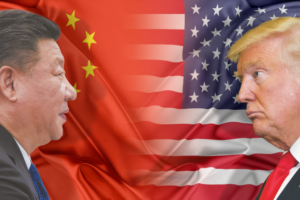By Nicholas Stolte || Staff Writer

President Trump is determined to maintain his controversial tariff policy, despite Chinese retaliation and the market selloff that accompanied the Chinese response. Within 24 hours of President Trump’s announcement of significant tariffs on Chinese goods, the Chinese government responded with a retaliatory tariff on over one hundred American goods. Trump’s tariff targets many Chinese industries, especially robotics and information technology. The Chinese are pursuing a legal challenge at the World Trade Organization, claiming the United States is discriminating against Chinese goods. They also responded with a wave of new tariffs on United States’ goods, targeting approximately 50 billion dollars worth of American exports, including soy, cars, and chemicals. There was a massive market sell-off as tensions between China and the United States continue to escalate, and their is fear that further escalation could lead to a trade war.
The Chinese government exuded confidence in the aftermath of the implementation of new tariffs and the Chinese Vice Minister of Finance declared that “China is not afraid of a trade war.” The Trump administration also maintained a confident posture as the President declared “When you’re already $500 Billion DOWN, you can’t lose!” on Twitter referencing the trade deficit the United States currently has with China. The Yen fell in value against the dollar, and the Chinese tariffs target less than 0.1 percent to the American economy leading to many experts claiming Trump’s policy could be successful. Trump also received unexpected support from the highest ranking Democrat in the nation, Chuck Schumer. The Senate Minority Leader offered kind words for the President. “Unfortunately, previous presidents, Democrat and Republican, just stood by as China did what it did to us. President Trump is exactly right, further adding that he would like to give the President “a big pat on the back.” While the President is receiving unexpected Democratic support, he also faces Republican opposition as the Republican Senate Leader Mitch McConnell expressed concern about Trump’s position, saying “I›m not a fan of tariffs, and I am nervous about what appears to be a growing trend in the administration to levy tariffs.”
The domestic controversy represents China’s biggest strength, as their authoritarian regime does not have to worry about dissent. President Xi Jinping has much more flexibility than President Trump, and the Chinese government can force Chinese banks to back industries reeling from American tariffs, even if it is not economically viable. A drawn-out trade war would put significant stress on the American economy. Larry Kudlow, Trump’s new top economic advisor, has expressed interest in negotiating with the Chinese as the tariffs are all still proposals and nothing is official. Other Trump advisors have expressed similar sentiments, so many experts predict the Trump administration is looking for a quick settlement that would rectify some of the administration’s issues with Chinese behavior regarding trade. Some speculate that John Bolton’s rise to National Security Advisor will lead to more aggressive stance against China, as he is far more hawkish than the former advisor H. R. McMaster, but that remains to be seen.
Junior Nicholas Stolte is a Staff Writer. His email is nstolte@fandm.edu